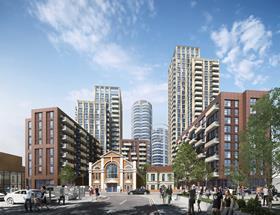Residents discouraged from mixing with the communities in which they live, claims Darren Rodwell
The leader of Barking and Dagenham council has spelled out his vision for bringing more housing to his community.

Speaking last week at a seminar in London on improving housing and regeneration through social value, organised by David Miller Architects, Darren Rodwell said he intended to speed up the building of new homes for local people but wanted development to be sustainable.
Barking and Dagenham’s wholly owned housing developer, Be First, is in the throes of building a number of schemes across the borough, including nearly 400 new homes in the centre of Barking (pictured), featuring nearly 200 affordable units. Trade union GMB has accused the council of not offering enough social housing on the project.
Rodwell explained the rationale for developing market sale homes as well as affordable units as being akin to a graphic equaliser, a device that musicians use to adjust the tone of an audio signal.
“We build up here [market sale] so that we can build down there [affordable housing]. We want to speed up our housebuilding activity, but we also want it to be sustainable. And we need to ask ourselves, are we building in London for Londoners or building for a profit?”
The council leader, who described himself politically as “traditional Labour”, said he wanted both Be First and Barking and Dagenham’s build-to-rent developer, Reside, to enable communities to flourish and empower people to become involved with things going on in their local area.
“That’s the problem with a lot of build-to-rent schemes being put up these days,” he said. “They become ‘invisible-gated’ developments, where things like gyms, workspaces, cinemas and restaurants are available on site and where residents rarely mix with the community around them. We want to avoid that.”
Barking & Dagenham has 4,829 people on its housing waiting list.
Rodwell also said Right to Buy schemes had reduced councils’ ability to provide affordable housing, since homes ended up with buy-to-let operators that charged considerably more than a council would. “Who’s benefiting from that?” he asked.
Also speaking at the seminar Deirdra Armsby, director of place shaping at Westminster council, argued that places “which don’t work for the people don’t serve a purpose”.
Armsby said she placed less emphasis on what a scheme looked like and more on what it did for the local community.
“Planning policy is a crude tool. It’s a lengthy process and things change by the time a scheme is eventually built. We need to think more about what a ‘place’ needs to be like in 15 or more years’ time.”
Armsby also said construction sites should do more to advertise their section 106 aspects. “They should acknowledge the good stuff that’s going on,” she added.











No comments yet